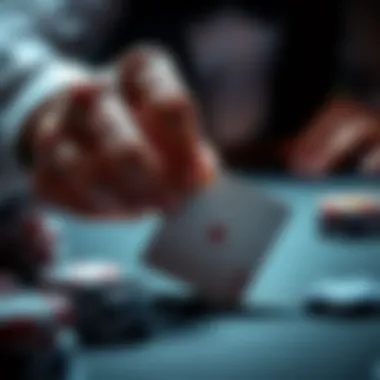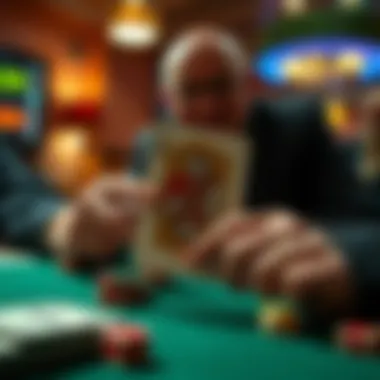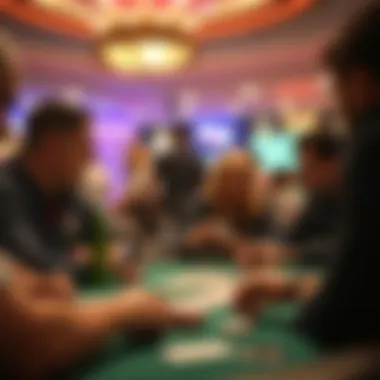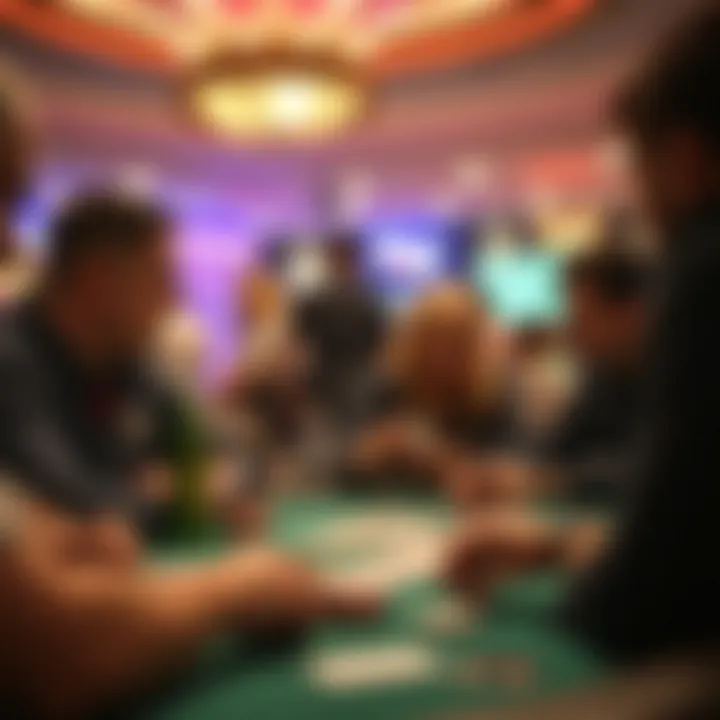The Art of Card Tricks: Impact on Gambling Culture


Intro
The allure of card tricks has captivated audiences for generations. From the smoky back rooms of casinos to elaborate performances on grand stages, these techniques bring not just excitement, but significant influence on the gambling world. This article takes a closer look at the common methods employed by players and magicians alike and examines their history and importance in games of chance and skill.
Understanding card tricks is not just for thrill-seekers; it's a vital part of the artistry and psychological warfare present in games like poker. Mastering these tricks offers players a means to enhance their experience and engage with the craft in a more profound way.
As we journey through this intricate landscape, we’ll uncover how card tricks operate—from the basics suited for novices to the advanced techniques wielded by seasoned pros. We’ll also analyze their influence on gaming practices and culture, making connections between skillful deception and player strategy. Expect to gain an appreciation for these skills that extend far beyond simple parlor games and into real-world applications of strategy in gambling.
Strategies and Tips
Understanding card tricks entails familiarity with various methods. This section will provide tools helpful for anyone looking to delve deeper.
Beginner Guides
Card tricks can appear intimidating, but starting with the basics sets a solid foundation:
- Practice the Basics: Learn fundamental shuffles like the overhand shuffle and the riffle shuffle. Initially, spend time mastering the techniques. Patience is key here.
- Self-Working Tricks: These are great to start with. Tricks relying on mathematical principles or preset configurations are easier to perform and do not require sleight of hand. An example would be the using a trick deck where the arrangement of cards is pre-determined.
- Mirror Techniques: Practice in front of a mirror. This not only helps in perfecting the performance but also offers insight into how others will perceive your actions.
Advanced Techniques
For those looking to add layers of complexity to their repertoire, consider exploring more sophisticated techniques:
- Card Control: Master the art of controlling the selected card during a game. Practice techniques like the pass, where the card is secretly moved during shuffling.
- False Shuffles: These shuffles look convincing but do not alter the card order. Learning to perform a false shuffle with finesse can give you the edge at the table.
- Psychological Manipulation: Engage in behaviors that influence opponents and make them more likely to act a specific way. This could include body language, eye contact, or simply the narrative you weave around your play.
"A card trick is not just a display of skill but a clever dance between reality and illusion. The magician's success often lies in misdirecting the audience."
Game Insights
Knowledge of current trends can give players an upper hand.
Game Reviews
Many games incorporate card tricks into their mechanics. Notable mentions include:
- Poker: A game of strategy and bluffing, where the nuances of card tricks can sway a hand.
- Bridge: Involves deep strategy and understanding of opponents' tendencies, where card manipulation can play a role.
- Magic the Gathering: Not a gambling game per se, but strategy and tricks in gameplay can mirror those found in gambling.
Trends in Gambling
It's essential to keep an ear to the ground regarding shifts in the gambling landscape. Some recent trends include:
- Online Gaming: Platforms continue to evolve, adopting more advanced algorithms that can simulate card tricks.
- Digital Decks: The use of technology to create variations of traditional games, often with added tricks or bonuses.
- Social Gambling: Games played in a more relaxed atmosphere often influence how card tricks are seen and utilized.
In summary, exploring card tricks provides both a lens through which to view gambling and an essential component of strategy and immersion in the community. Whether you are just planting the seeds of curiosity or wielding advanced techniques, a deeper understanding can notably enrich your experience in the gaming world.
For further insights, you may explore resources at Wikipedia, Britannica, and Reddit.
Researching these complexities will lead to not just a better game but, ultimately, a more rewarding journey.
Prolusion to Card Tricks
Card tricks can be as captivating as they are misleading. In the world of gambling, understanding the nuances of card tricks transcends mere entertainment; it morphs into a vital skill set that can influence outcomes at the table. For gamblers, the ability to perform card tricks is often seen as an advantageous edge. Prior to diving into the practical effects of these tricks, it becomes essential to establish a foundation.
Defining Card Tricks
Card tricks involve various methods to manipulate or present card games in a way that misleads other players or enhances one's own performance. At its core, a card trick can be straightforward or highly complex, delving into techniques ranging from simple shuffling to more advanced sleight of hand.
Tricks are essentially tools of deception, designed not only to entertain but also to provide adept players with a psychological edge. A player could, for example, easily turn the tide in a poker contest with just a flick of the wrist.
Historical Context
Card tricks have a venerable past that traces back centuries. Initially used in street performances, they garnered attention due to their mysterious nature. With the renaissance of gambling in the late 18th and early 19th centuries, the implementation of card techniques became both a skill and an art form among gamblers.
In the 1800s, figures such as Dai Vernon revolutionized the perception of card manipulation, pulling it from the shadows of mere trickery into the limelight as a distinguished craft. The uncanny ability to shuffle, cut, or manipulate cards made its way into prestigious gaming establishments, often becoming a linchpin in high-stakes games.
Relevance in Modern Gambling
In today's fast-paced poker scenes and casinos, the psychological aspect of card tricks remains relevant. Gamblers are often not just playing the cards; they are engaging in a mental chess match. Understanding and utilizing card tricks enhances gameplay strategies among savvy players.
Moreover, the thrill of outsmarting opponents often boosts a player’s confidence. Confidence can shift the odds, turning the most mundane game into a multifaceted struggle of wits. As gambling environments evolve, so too do techniques used to master or counteract card tricks.
Classification of Card Tricks
Understanding card tricks and their classifications is crucial. The journey into card tricks is not just about flashy moves; it’s about understanding the underlying mechanics and psychology that allow one to execute these tricks successfully. This section will unpack the various types of card tricks, highlighting their significance, strategies, and unique benefits. By doing so, gamblers and enthusiasts can gain insights that enhance their gameplay, sharpen their skills, and perhaps even lead to fortune at the tables.
Sleight of Hand Techniques
Sleight of hand tricks are an art form, a dance of fingers and deception. These techniques revolve around nimble fingers and quick reflexes, allowing the magician to manipulate cards right under the noses of spectators. What makes sleight of hand captivating is that it relies heavily on skill and practice.
- The Basics: One common technique known as the "double lift" allows a player to lift two cards while making it appear as only one. This creates an illusion that can mislead opponents in card games.
- Palming: Another basic maneuver is palming, where the magician disguises a card in their hand, making it invisible to others.
- Misdirection: It's not just what you do with your hands; it’s how you lead your audience's eyes. A well-timed distraction can mislead even the most vigilant observers.


Sleight of hand tricks require immense dedication. Practicing in front of a mirror can help a beginner develop precision and confidence. With time, these techniques can improve a player's ability to blend skill with deception.
Mathematical Principles
Mathematics might not be the first thing that comes to mind when thinking about card tricks. Yet, mathematical principles play a substantial role in forming the backbone of various card games and tricks. Understanding odds, probabilities, and even combinatorial mathematics can give players a strategic edge.
- Probabilities in Action: By calculating the probabilities of drawing certain cards, gamblers can make informed decisions. For instance, knowing how many cards remain in the deck after a few have been drawn updates a player’s strategy.
- Card Counting: Techniques such as card counting use these mathematical concepts to help players keep track of cards that have been dealt. This strategy, while controversial in casinos, offers an avenue of empowerment for skilled gamblers.
- Combinatorics: This can assist in devising new tricks or analyzing patterns in card games. A solid grasp of these principles can lead to better decision-making in high-stakes games.
In essence, an understanding of mathematical concepts not only enhances the execution of card tricks but also sharpens a gambler’s overall gameplay approach.
Psychological Tricks
Psychological tricks are perhaps the subtlest aspects of card tricks, yet they are immensely powerful. They play on the human psyche, exploiting biases, distractions, and expectations to influence decisions effectively.
- The Power of Suggestion: Using verbal cues or body language can shape how players perceive a game situation. A confident declaration about a certain card can lead opponents to believe it’s critical, swaying their choices.
- Cognitive Load: When players are overwhelmed with information or options, they are more likely to make mistakes. A well-timed challenging question or complex bet can introduce mental strain, making them err.
- Emotional Manipulation: Triggering excitement or fear can lead people to act against their better judgments. A gambler who senses an opponent is nervous might decide to bluff more often.
"Every card trick and technique is a pathway to greater understanding in the realm of gambling. Dive deep into these classifications to evolve your skills further."
Exploring sleight of hand, mathematical principles, and psychological tricks unveils the complex interplay between skill, strategy, and human behavior in the world of games. As you delve into mastering these techniques, you pave your way toward becoming a more formidable player at any table.
Techniques for Mastering Card Tricks
Mastering card tricks involves more than just following a set of commands or rote learning. It requires a deep dive into the motley of skills that can elevate a player’s performance, especially in competitive gambling settings. The importance of mastering these techniques cannot be understated – they enhance not just the player’s efficiency at the table, but also their engagement and enjoyment of the game. By honing these skills, gamblers can gain a competitive edge, boosting their confidence and adding layers of psychological strategy that can baffle opponents.
Basic Techniques for Beginners
Every expert was once a novice. If you’re just stepping into the world of card tricks, starting with the basics is crucial. Here are some foundational techniques that can set you on the right path:
- Grip and Handling: Understand how to correctly hold a deck of cards. A proper grip can make or break your ability to perform various tricks. Experiment with how the cards feel in your hands and practice moving them fluidly.
- Simple Cuts and Shuffles: Learning basic shuffles such as the riffle shuffle or overhand shuffle is essential. These are not just routine; they’re the backbone of many card tricks. Performing these well can make your game seem effortless.
- The Force: This simple technique allows you to guide a spectator to pick a specific card without them realizing it. Mastering the art of forcing increases your control over the game presentation.
These techniques form the springboard to more complex maneuvers. They build the muscle memory required to perform more intricate tricks later on.
Intermediate Skills Development
Once you’ve gotten a handle on basic techniques, it’s time to elevate your game. Intermediate skills require not only practice but also an understanding of misdirection and audience engagement:
- The Palm: This skill allows you to hide a card in your hand, crucial for advanced tricks. It takes practice to achieve a natural look. Your audience shouldn’t suspect that you hold more than is visible.
- The Break: Understanding how to create a break (a pause between cards in your grip) can be invaluable for setting up future moves without drawing attention. It’s often a stepping stone to more sophisticated methods.
- False Shuffles: The ability to make a shuffle appear genuine while maintaining the order of the cards can give you an edge. It’s about skillfully manipulating the deck without your opponents catching on.
These skills require hours of dedicated practice, but as you grow more adept, they’ll affect your overall strategy and home game presentation.
Advanced Mastery Techniques
At the pinnacle of card handling lies mastery. This stage isn’t just about techniques; it’s about crafting an entire performance. Here are skills that can propel you into the realm of professional card handling:
- Card Production: Advanced techniques like producing cards from nowhere or creating illusions enhance your repertoire. This demands complete control and confidence in execution.
- Full Deck Control: Mastering the ability to control the entire deck gives you an unparalleled advantage in gameplay. You can dictate the flow of the game, causing uncertainty among your opponents.
- Theatrical Presentation: Understanding that card tricks are as much about showing as they are about execution can elevate your performance. Engaging storytelling and audience interaction can transform a simple trick into an unforgettable experience.
Achieving mastery in card tricks requires relentless practice and a willingness to experiment. Each technique learned builds on the last, creating a network of skills that intertwine to improve your gambling strategy.
"To be a true magician at the card table, one must not just play the cards, but master the dance of deception and skillful artistry."
For further study, consider visiting resources like Wikipedia, Britannica, or online forums such as Reddit where a wealth of knowledge and experiences can accelerate your learning journey.
Influence of Card Tricks in Gambling Strategy
The art of card tricks isn’t just a pastime for magicians; it actually plays a significant role in gambling strategy. The influence of these tricks can enhance how players engage with the game, influencing outcomes in ways both subtle and overt. When a player successfully employs card tricks, it goes beyond mere magic—it's about manipulating perception, strategy, and instinct. Understanding the depth of this influence, especially in the world of gambling, provides valuable insights to both novice and seasoned gamblers.
Enhancing Player Confidence
When a player masters a card trick, it does wonders for their self-esteem. Picture this: a player performs a seemingly impossible card manipulation at a home game with friends. Suddenly, the nagging anxiety of making the wrong bet fades away, replaced with a sense of control and assurance. This newfound confidence can serve as a powerful weapon at the gambling table.
- Boost in Decision-Making: Players who feel confident are more likely to make bold decisions. This can sway the game in their favor. It influences the choices they make—whether to raise, fold, or go all-in.
- Creating a Psychological Edge: A confident player naturally exudes an aura that can intimidate opponents, fundamentally shifting the dynamics of the game. Other players may second-guess their strategies simply by witnessing a confident performance.
It’s clear that the psychological state maintained through the use of card tricks can alter not just a player’s approach, but the entire atmosphere at the table.
Element of Surprise
Surprise is often the spice of life, and the same holds true in gambling. The successful execution of card tricks can catch opponents off guard, especially in high-stakes situations. Imagine a scenario where players expect the usual predictable plays, but suddenly a well-executed sleight of hand alters everything.
- Unpredictability: When you employ tricks that astonish your table mates, predictability disappears. Opponents could find themselves out of sorts, steering them away from their strategies.
- Distraction Techniques: Utilizing subtle card manipulations while maintaining eye contact or engaging your opponents in conversation can break their focus. It adds an additional layer of challenge; you are not just playing cards, you are also playing the players.
The element of surprise, wrapped in the skill of card tricks, can add an entirely new dimension to the game that keeps it fresh and engaging.
Psychological Warfare Against Opponents
Gambling is as much a mental battle as it is a game of chance. Employing psychological tricks through card manipulation can be tantamount to psychological warfare. It allows a player to exploit the assumptions and habits of their opponents.
- Reading Body Language: A player skilled in card tricks is often adept at reading opponents. If they throw in a trick right after a confident display, it might make other players second guess their assessments.
- Playing the Odds: The mere anticipation of a trick adds a layer of tension in the atmosphere. Opponents might become overly cautious, changing their normal betting patterns. This can lead to mistakes, as fear or confusion prompts less strategic play.
In summary, when card tricks are interwoven into the fabric of gambling strategy, it creates a dynamic interplay of psychology. Players armed with these skills do not merely play the cards; they play the game on a much deeper level.


Mastering card tricks is like wielding a weapon in the world of gambling; it can elevate a player's strategy and reshape the gaming experience, offering an unconventional edge that is hard to quantify.
Understanding this complex relationship between card tricks and gambling strategy opens new avenues for exploration and mastery in the art of playing cards.
Cultural Significance of Card Tricks
When we dive into the realm of card tricks, it quickly becomes evident that these techniques are more than just entertaining spectacles; they weave a rich tapestry of cultural significance that transcends mere gaming. Card tricks have historically served as a bridge between communities, a means of storytelling, and an exploration of human psychology. These elements come to life in various forms of media and cultural expressions, reflecting the broader influence card tricks have on societal norms and values.
Card Tricks in Popular Media
Card tricks have certainly made their mark in popular media, appearing in movies, television shows, and even books. One cannot ignore the iconic role they play in films like "The Prestige," where magic and deception intertwine in a masterful dance. This portrayal not only captivates audiences but elevates the perception of card tricks from party tricks to an art form. Similarly, TV shows like "America's Got Talent" frequently feature card trick performances that leave audiences astonished.
Through film and television, card tricks capture the essence of suspense and surprise, resonating with viewers. They reflect larger themes such as trust, betrayal, and the thin line between reality and illusion. The rise of social media further enhances their reach, as magicians now use platforms like Instagram and TikTok to share their craft and connect with a global audience. This evolution highlights how card tricks adapt and thrive, cementing their place in modern cultural landscapes.
Symbolism in Various Cultures
Across different cultures, card tricks symbolize much more than mere entertainment. For instance, in many Asian cultures, the act of playing cards is often linked to strategy, intelligence, and wisdom. In cases where cards serve as metaphors for life, winning or losing can represent success and failure in broader societal contexts. From tricksters in folklore who outsmart their foes to card games where fate hangs on each shuffle, these elements reveal deep cultural narratives.
In Western traditions, especially among gamblers, there is a symbolic significance too. Cards often embody risk and reward, mirroring the ups and downs of life. The phrase "playing your cards right" implies making wise choices, directly tying card tricks to decision-making and strategy. Beyond the glitzy casino lights lie profound cultural implications that shape human interactions daily.
Evolution of Card Games and Tricks
The evolution of card games and tricks mirrors societal changes. Historically, card games have moved from simple pastime activities to complex forms of entertainment intertwined with skill and strategy. Early forms of card tricks can be traced back to the Renaissance, where they were entwined with alchemy and mysticism. Over the centuries, they’ve transformed, shedding archaic beliefs and adapting to modern sensibilities.
Today, card tricks blend professionalism with entertainment. From the polished performances of David Copperfield to street magic seen in urban corners, they adapt to various venues and audiences. The development of technology also plays a role; with innovations, like apps that simulate card games, the tricks and techniques now reach an even broader audience. Though card tricks evolve, their core essence—delight and astonishment—remains unchanged.
As we observe the journey of card tricks through culture and society, we appreciate their depth and significance far beyond the surface.
"Magic is all about illusion and dexterity. It's a reflection of how we perceive reality, shaped intricately by our culture."
The realm of card tricks is rich and intricate, full of symbolism and relevance that resonates on multiple levels. Understanding their cultural significance enriches both the practice and appreciation of these fascinating techniques.
Ethics of Card Tricks in Gambling
The topic of ethics regarding card tricks in gambling brings to light a fascinating conversation about the fine line between skillful play and deception. Within this realm, understanding ethical boundaries becomes paramount for players and spectators alike. Ethical conduct not only enhances the integrity of the game but also fosters a respectful atmosphere for all involved. When players engage in tricks that may have an unfair influence on the game, it settles into a murky area that deserves scrutiny.
Fair Play vs. Deception
When it comes to gambling, every player is keenly aware of the concept of fair play. Fair play involves engaging honestly within the rules of the game. Card tricks, particularly those that deceive opponents, raise eyebrows concerning where fair play ends and deception begins. Using tricks ethically can elevate the game, adding an element of flair without compromising the integrity of the play.
- Sleight of hand: Masterful sleight of hand can impress and astound while still adhering to the rules of the game.
- Psychological manipulation: Utilizing psychological tricks can enhance the game by allowing players to gain insights into their opponents’ behaviors, promoting a strategic rather than deceptive approach.
- Cheating: On the other hand, employing deceptive practices, such as marking cards or colluding with other players, crosses the line into unethical territory, tarnishing not just individual reputations but the entire gaming environment.
The distinction between fair play and deception is particularly significant due to the trust that players must place in one another to keep the game enjoyable and competitive. As players sharpen their skills in card tricks, it is vital to remain aware of the ethical implications that accompany those abilities.
Legal Implications
The legal implications of card tricks in gambling can vary widely depending on jurisdiction. Some places maintain strict laws surrounding gambling practices, while others allow for a more lenient approach toward performance and tricks used in gameplay. This dichotomy necessitates a careful examination from players and conductors alike.
To navigate these waters effectively, players should familiarize themselves with local gambling laws and regulations which may differ regarding card games.
- Licensing Requirements: In places where casinos and games require licensing, card tricks might be subject to regulation to ensure fairness and transparency.
- Legal Consequences: If players are found to be using deceptive practices, they can face various consequences ranging from fines to criminal charges, impacting their ability to play in the future.
- Impact on Industry: Reputational damage can extend beyond individuals to influence the broader gambling industry when unethical practices rear their heads in public. This can lead to decreased patronage as trust erodes.
In summary, discussing the ethics of card tricks within gambling underscores the need for a delicate balance. Striking this balance involves deepening one's understanding of both fair play and legal regulations to ensure a respectful, enjoyable, and lawful gambling experience.
Practical Applications of Card Tricks in Gaming Environments
Understanding how card tricks are used across various gaming environments brings insight into not only the artistry behind them but also their functionality in enhancing the gambling experience. Card tricks can elevate the atmosphere, engage players, and serve strategic roles that go beyond mere entertainment. In this section, we will delve into three primary settings where card tricks find practical application: casinos, online gaming platforms, and home games or gatherings.
Use in Casinos
Casinos are the breeding ground for high-stakes games where every bit of psychological advantage counts. Card tricks in casinos can create an immersive experience that entices the excitement of players and spectators alike. From the deft hands of professional dealers shuffling decks with a flourish to magicians performing tricks right at the tables, the atmosphere is electric.
- Engagement: A well-performed card trick captivates an audience, creating a buzz around a game. This excitement can lead to more players inclined to participate, boosting the casino's bottom line. It's akin to a well-crafted trailer for a movie—if it gets the crowd excited, they'll want to see the main event.
- Distracting Opponents: In games like poker, players often employ sleight of hand techniques or psychological tricks to mislead opponents about their hands. This layer of strategy can significantly affect the outcome of a game, making every flick of a card potentially pivotal.
“In the game of poker, nothing is as powerful as the human touch entwined with deception. Card tricks can spark a player's intuition, leading to strategic leaps.”
- Building Rapport: For dealers, performing card tricks can help establish a rapport with the players, making them feel more at ease. This comfort can enhance the overall gambling experience and foster a loyal clientele who come back seeking not only a game but also a friendly and engaging environment.
Online Gaming Platforms
The digital age has transformed how card tricks are perceived and executed in gaming platforms. While traditional sleight of hand may seem absent, the essence of card tricks remains intact through several innovative practices.
- Virtual Engagement: Online casinos often use live-streamed games where real dealers interact with players through video. In these settings, card tricks such as the artful shuffle or a quick reveal can still be exhibited, albeit in a digital format. This kind of interactivity enhances the online experience, bridging the gap between physical and online gaming.
- Augmented Reality (AR): Some online platforms are incorporating AR technology, bringing card tricks to life in players' homes. Imagine perceiving a virtual card being shuffled right in front of your eyes as you sit in your living room. This not only makes the experience more interactive but also maintains the thrill that physical casinos provide.
- User-Generated Content: Players share their card tricks and techniques on social media platforms and forums like Reddit, creating communal learning environments. This sharing encourages enthusiasts to experiment with strategies and showcase their skills in virtual settings. These practices foster a vibrant community of players who share tips and advice, enriching the online gambling landscape.
Home Games and Gatherings
Home games are where card tricks often flourish, transforming a simple gathering into an unforgettable experience. Informal settings allow for creativity and experimentation, making card tricks more accessible to the average player.
- Livening Up the Atmosphere: A casual game night can benefit greatly from a little flair. Performing card tricks can lighten the mood and break the ice, especially among newer players. A well-timed trick can turn a losing hand into a moment to laugh and bond.
- Teaching and Learning: Home games serve as a platform for novice players to learn and practice new tricks without the pressure of a casino environment. Friends can share tips and provide constructive feedback, creating a supportive environment conducive to learning.
- Memorable Experiences: When tricks are performed successfully, they create memorable moments that friends will talk about long after the cards have been put away. These instances not only enrich the experience of the game but can also strengthen friendships, making the gathering more than just about winning or losing.


In summary, card tricks hold substantial practical applications in various gaming environments. Whether it's fostering community in home games, enhancing engagement in online platforms, or injecting excitement into casino floors, they play a role that extends far beyond entertainment. Recognizing these applications can help players leverage these skills to enhance their gambling experience, irrespective of where they choose to play.
Challenges in Learning Card Tricks
Learning card tricks can be a mixed bag of excitement and frustration, and understanding the challenges involved is crucial for anyone interested in the art. The journey of mastering card tricks requires dedication, patience, and a keen eye for detail. While the allure of dazzling friends or gaining an edge in gambling is enticing, there are hurdles that can trip up even the most enthusiastic beginners.
Common Mistakes to Avoid
When entering the world of card tricks, novices often stumble upon a few familiar traps. One prime blunder is rushing through the learning process. Enthusiasm can lead to an urge to impress before fully grasping the basics. It's simple to misjudge the importance of practicing fundamental techniques before advancing to more complex tricks. A classic example is trying to perform a complex card flourish before mastering the simple mechanics of shuffling.
Several common errors include:
- Neglecting Practice: Assuming that watching tutorials is enough.
- Ignoring Finger Placement: Proper positioning is key to seamless execution.
- Forgetting Timing: Mastering card tricks is about more than just skill; timing can make or break the illusion.
Avoiding these pitfalls can significantly enhance the learning experience. Instead of skimming the surface, focus on internalizing foundational skills. This creates a smoother transition into more challenging tricks and bolsters confidence during performance.
Time Commitment and Practice
It’s no secret that proficiency in card tricks doesn’t happen overnight. Dedication to practicing regularly is vital; it's the heart and soul of mastering any new skill. One cannot merely allot a few minutes here and there. A structured practice schedule, perhaps even daily sessions of thirty minutes to an hour, might be the ticket to success.
Many experts recommend breaking down practice into specific areas:
- Sleight of Hand Techniques: Focusing on each gesture and motion until it feels second nature.
- Performance Practice: Rehearsing in front of a mirror or recording oneself to catch any flaws in technique.
- Conceptual Learning: Studyingthe psychological aspects of tricks to understand how to engage the audience effectively.
The commitment extends beyond just hours put in but rather the quality of that time. In addition to traditional achieving goals, engaging in community workshops or online classes can amplify the learning experience. Constant interaction with other learners provides fresh insights, keeping the journey exciting and diverse.
"Mastery in magic and card tricks is less about memorization and more about muscle memory and confidence cultivation."
Navigating the bumps along the road to mastering card tricks can be challenging, yet it forms part of a rewarding experience that eventually pays off in both skill and enjoyment.
Learning Resources for Card Tricks
Knowing where to look for quality learning resources is vital for anyone serious about mastering card tricks. In the intricate world of card manipulation, what you read and who you connect with can make a world of difference. Resources can provide insight into various techniques, historical context, and unique strategies that are essential for both beginners and seasoned players. They help to refine skills and enhance understanding of the psychological nuances that come with card games.
Whether you are someone starting fresh or a player seeking to polish existing skills, tapping into the right resources ensures a more enriching gambling experience. The elaborate blend of books, online courses, and community discussions serves not only to educate but also to inspire growth in the craft. Let’s break down these avenues.
Books and Literature
Books have long been a traditional staple for learning various skills, and card tricks are no exception. Many seasoned magicians have penned down their insights, tips, and tricks into volumes that any aspiring card artist should consider. A few noteworthy titles include:
- "The Royal Road to Card Magic" by Jean Hugard and Frederick Braue: This book walks readers through techniques step-by-step, making it perfect for beginners.
- "Card College" series by Roberto Giobbi: These books delve deep into both the practical aspects and the theory of card magic, providing great depth of knowledge.
- "The Expert at the Card Table" by S.W. Erdnase: An old classic that continues to influence card magicians with its profound understanding of the psychology and mechanics of card games.
These literary works offer not just techniques but also stories that enlighten readers about the history and cultural significance of card tricks. They even include anecdotes that make the journey engaging. They often highlight common pitfalls to avoid and tips that seasoned professionals have learned through experience, which can prove invaluable.
Online Tutorials and Courses
In recent years, the internet has become an unmatched arena for learning. Platforms like YouTube, Udemy, and various magic-specific websites feature a plethora of video tutorials that cater to every learning style. Just a few benefits of online resources include:
- Visual Guidance: Watching tricks being performed can significantly aid in understanding the nuances that books alone may not convey.
- Accessible Feedback: Many platforms allow interaction with instructors and peers, which can lead to constructive critiques.
- Flexible Learning: You can learn at your own pace and revisit difficult concepts as needed.
For instance:
- YouTube offers channels like "Illusionist" and "Card Magic Academy," where you can find tutorials ranging from basic shuffles to professional card tricks.
- Udemy has structured courses that guide learners from basics to advanced techniques, complete with quizzes and practical assignments.
These online resources are particularly useful as they can adapt to trends, providing contemporary insights into techniques that are currently popular in gambling environments.
Communities and Forums
Apart from books and online courses, communities and forums can be a treasure trove of knowledge. Engaging with fellow enthusiasts allows players to exchange tips, tricks, and experiences. Places like Reddit, particularly the subreddit r/Magic, offer a platform for discussions on techniques, best practices, and personal stories from both learners and professionals. Benefits of joining these communities include:
- Shared Experiences: Hearing about both rookie errors and triumphs from others can provide perspective and inspire resilience.
- Networking Opportunities: Building connections with other magicians can lead to collaborations or mentorship.
- Access to Exclusive Content: Many groups share resources not found in mainstream literature or courses, including rare tricks and insights.
In summary, the landscape of learning resources for card tricks is broad and varied. Books provide foundational knowledge, online tutorials offer visual and interactive learning, and communities foster a sense of camaraderie and shared experience. By delving into these resources, players can greatly enrich their understanding and enhance their skills, ultimately leading to more engaging and successful experiences in the gambling world.
Epilogue
The realm of card tricks is not just about flashy moves and sleight of hand; it bears significant implications for gambling, both in terms of strategy and culture. This article emphasizes the multifaceted nature of card tricks, from the historical context to their applications in contemporary gaming environments, showing how these techniques enhance the gambling experience.
Recap of Key Points
A well-rounded understanding of card tricks fosters both enjoyment and competence among players. Here are the vital points we discussed:
- Historical Context: Card tricks have deep roots, enriching the story of gambling from the past to the present.
- Techniques and Mastery: From beginners honing basic skills to advanced players refining their craftsmanship, mastering card tricks requires dedication.
- Psychological Edge: Utilizing deception not only boosts player confidence but also creates elements of surprise, influencing the dynamics of a game.
- Cultural Impact: These tricks serve as a bridge between diverse cultures, reflective of how universal the appeal of card games is.
- Ethics and Fair Play: Understanding the thin line between skillful play and deception is crucial for maintaining integrity in gambling.
Emphasizing these points provides both current and aspiring gamblers with a roadmap to navigate their gaming journeys.
The Future of Card Tricks in Gambling
Looking ahead, the role of card tricks in gambling is likely to evolve even further. With technology encroaching upon traditional methods, players are constantly adapting. Online platforms are seeing a rise in sophisticated algorithms that incorporate card trick strategies. Virtual reality systems might even simulate environments where these tricks can be showcased and mastered.
- The acceptance of card tricks as a legitimate strategy rather than mere deceit may gain traction.
- New forms of genuine interaction will allow players to engage more deeply with tricks, whether through community forums or social media platforms.
- Gamification of learning card tricks can emerge, where novices can learn through play, engage with experienced players, and participate in competitions.
The history and art of card tricks not only enrich the gaming experience but also offer a unique lens through which to view the interplay of skill, ethics, and cultural significance in gambling.
For further reading on card tricks and their influence in gaming, consider exploring resources like Wikipedia on Card Games, community discussions on Reddit's Gambling Forum, or even academic insights from Britannica.







